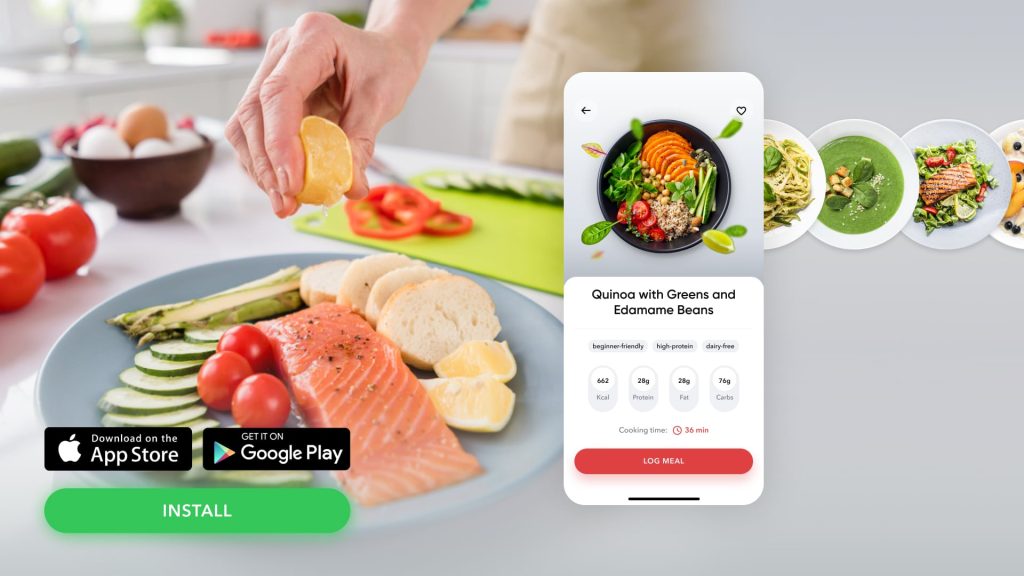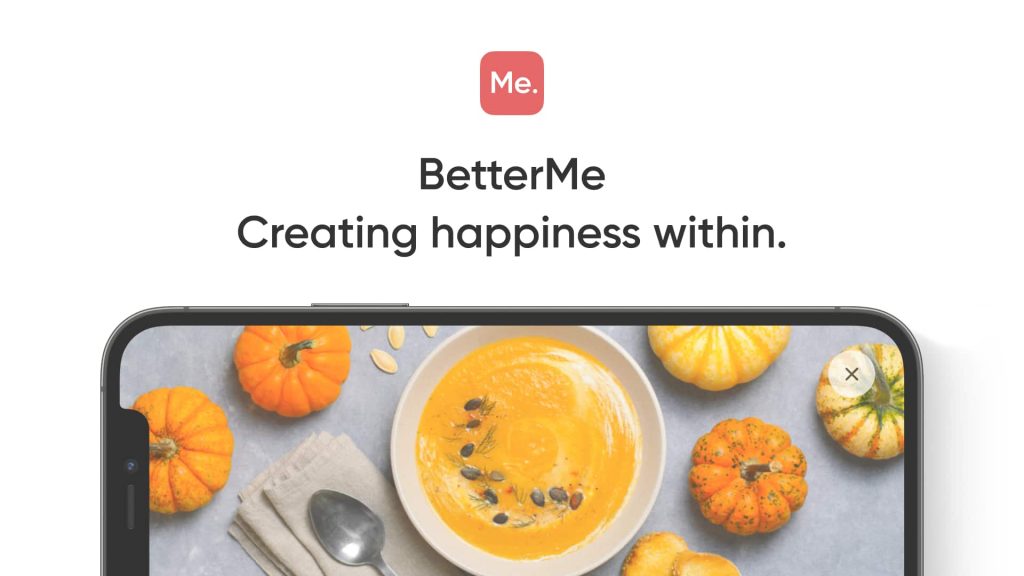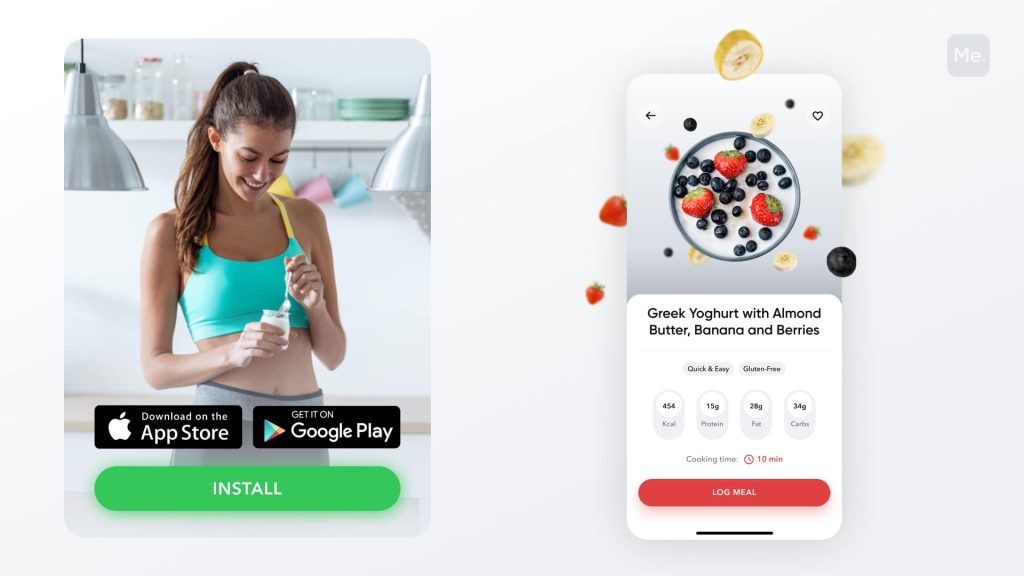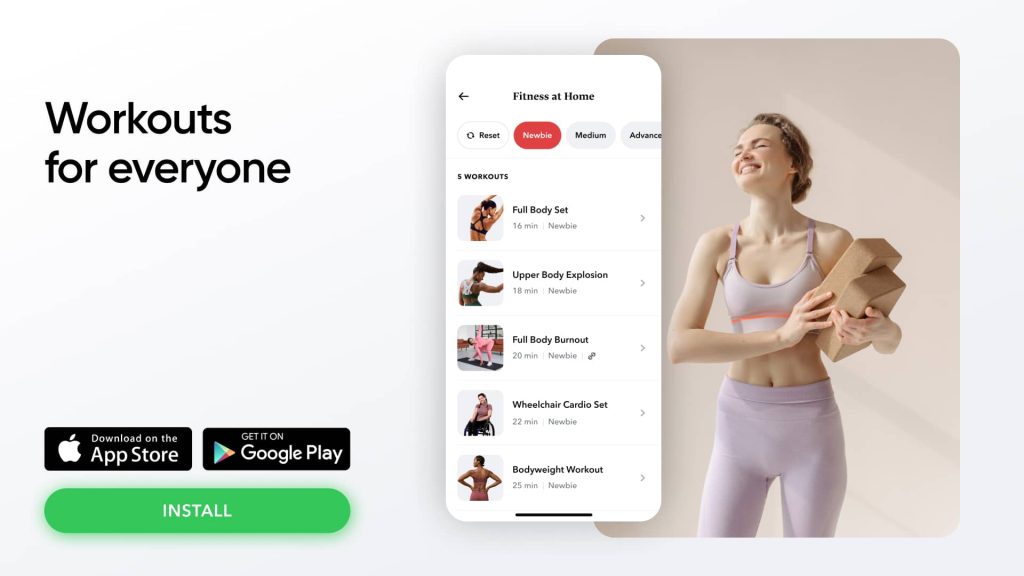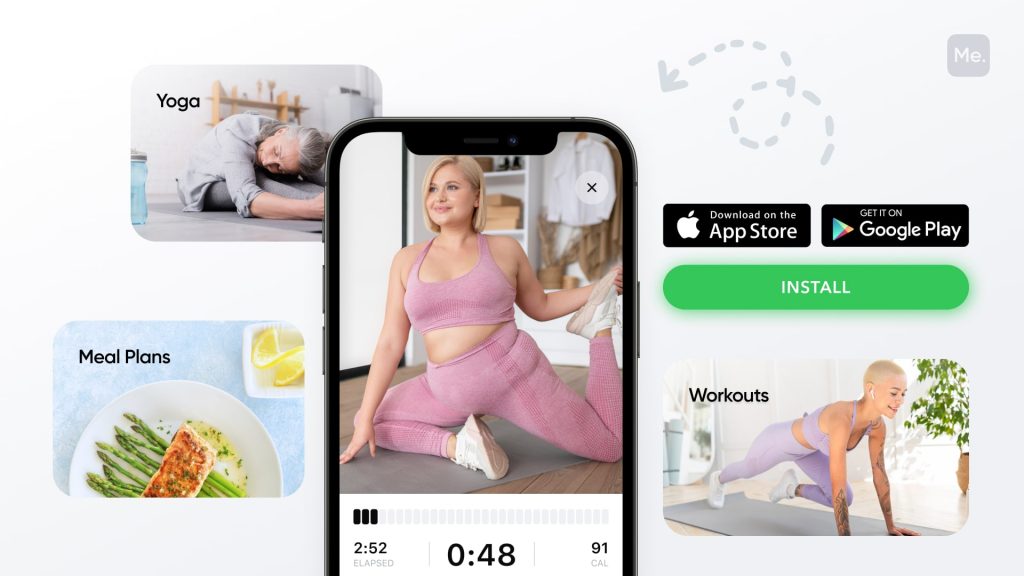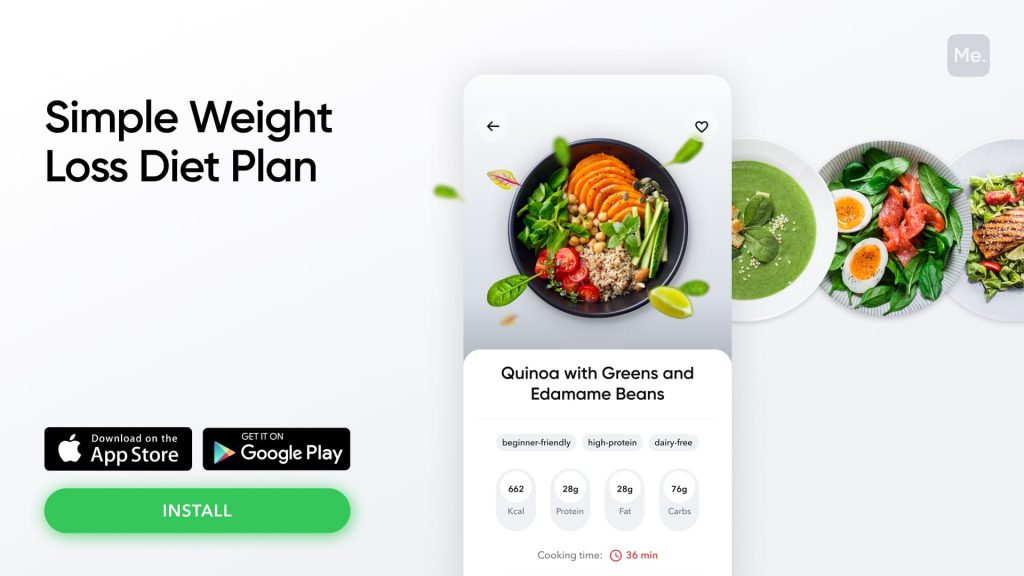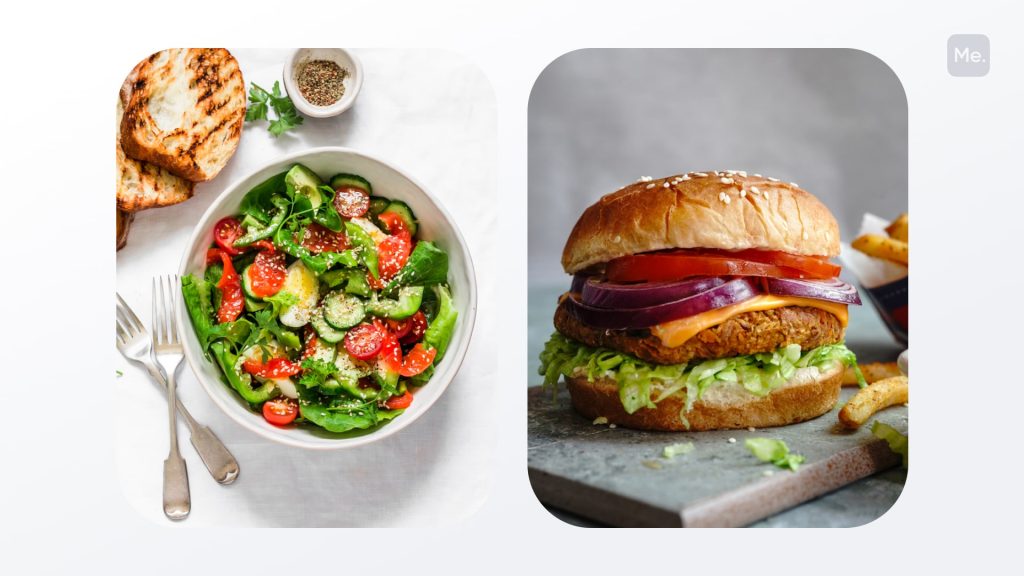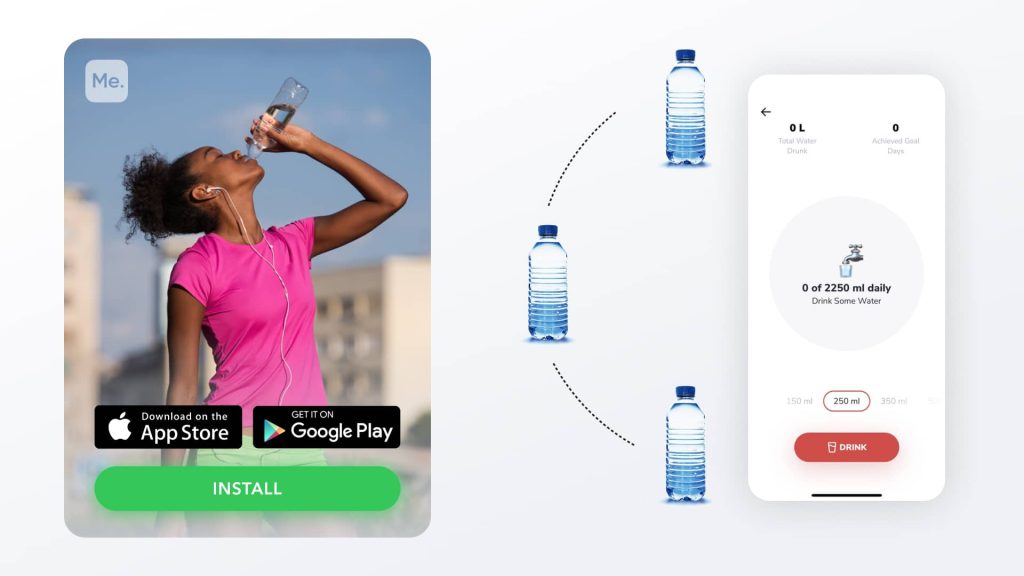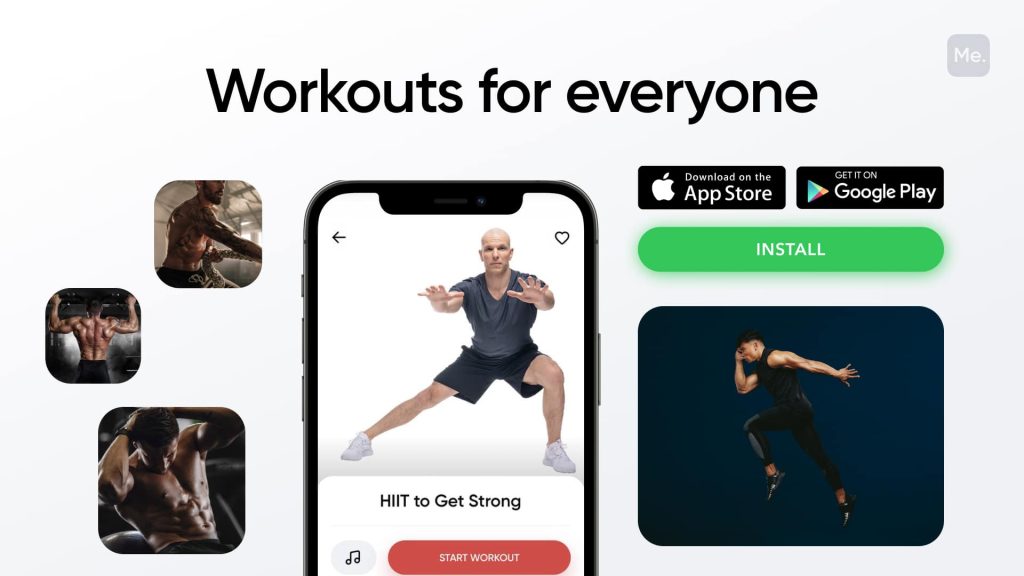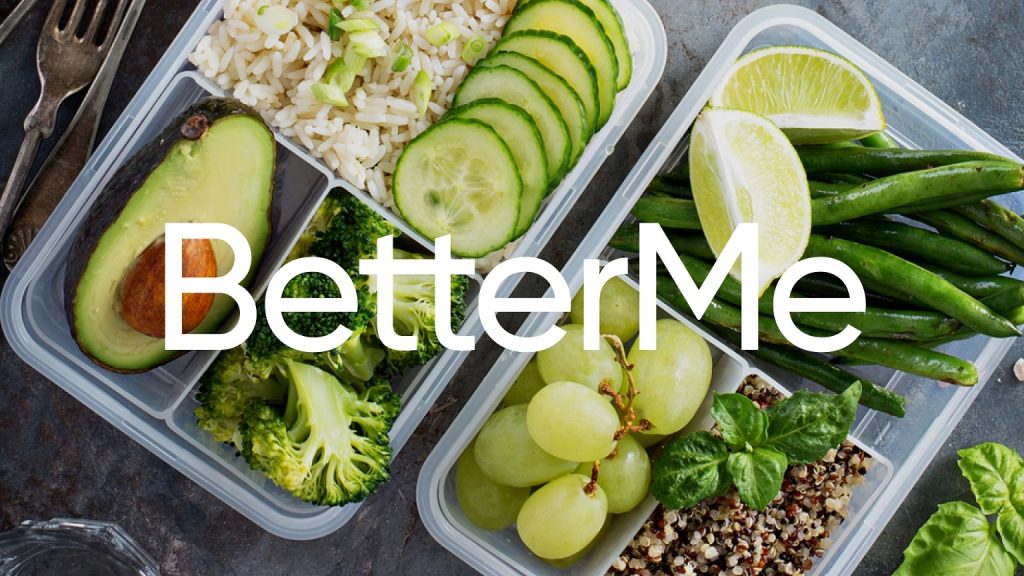Trusting your instincts when it comes to food may not sound like a good idea, but evidence suggests that attunement to your body’s internal signals has many benefits. With intuitive eating, you’re free to eat whatever, whenever, and however you want.
Get your personalized
meal plan!
However, you have to follow the ten principles of intuitive eating that help you learn how to listen to your body’s internal signals and trust yourself around food. Learn more about this in the subsequent sections!
What Is Intuitive Eating?
Intuitive eating is a non-diet approach that follows internal cues such as hunger and satiety rather than diets, rules, and feeding disciplines. With intuitive eating, you learn to let go of external constraints that expect you to eat a certain way and focus on what your body wants to eat, when, and how.
The nutrition philosophy allows you to indulge in meals without cravings, guilt, nor stress and instead interact positively with food without worry or external/ emotional pressures. The key is to gain attunement to your body’s hunger, and satiety cues and disregard set schedules, diets, and willpower.
The non-diet approach to nutrition was created in 1995 by two registered dietitians, Evelyn Tribole and Elyse Resch. Their model is evidence-based and stems from their experience working with clients (2). They believed that nutrition should be more behavior-focused rather than rule-focused or restrictive.
From their intuitive eating book, they highlighted four characteristics of intuitive eaters. They include;
- Eating for physical rather than emotional reasons.
- Presence of unconditional permission to eat.
- Reliance on hunger and satiety cues.
- Body-food choice congruence where your body is aware of what it wants and needs to eat.
The 10 Principles Of Intuitive Eating
As a self-care eating framework, intuitive eating includes a ten-step process with principles that integrate instinct, emotion, and rational thought. They include:
-
Reject The Diet Mentality
The diet mentality is the notion that you should follow a feeding discipline that will offer your body the best result. There’s no perfect meal plan; instead, there’s fulfillment in the discovery of different foods. Discard all those diet magazines, cancel those subscriptions, and focus on trusting yourself around food without limitations.
Dropping pounds by the dozens without putting yourself through the wringer is everyone’s weight loss pipe dream. But what if we told you that the BetterMe app can make that happen? Keep yourself in prime shape with our fat-blasting workouts, delicious budget-sparing recipes, and body-transforming challenges with our app!
-
Honor Your Hunger
You need to understand that your body “eats to live”. Hunger is a normal biological process that you should obey and honor by feeding your body. When you respect your hunger cues, you give your body energy to function effectively.
If you dishonor the urge to eat and wait until you’re severely hungry or have symptoms such as a sluggish and irritable behavior, having a headache, or a growling stomach, you’re creating an imbalance. Imbalance can lead to overeating, binge eating, or cravings.
Honoring your hunger enables you to rebuild trust with yourself and food with moderate and conscious eating.
-
Make Peace With Food
Some of you can attest to food labeling where certain foods are wrong regardless of how they look or taste, and others are good even though they may not be what you want to eat. Intuitive eating encourages you to allow yourself to eat whatever you want; unconditional permission.
With unlimited access to food, you no longer have cravings because you can eat rather than overeating your favorite snack when you get the urge to eat. Making peace with food relieves feelings of guilt, like that you’re not following your diet or you’re feeding on something unhealthy.
-
Challenge The Food Police
The food police refer to those thoughts that tell you what you should eat, how much, at what time, and have many other rules. Say no to those voices that convince you that you should count calories and restrict your meals to only twice a day. These guilt-provoking indictments don’t allow you to discover the satisfaction of eating with freedom.
-
Discover The Satisfaction Factor
Finding satisfaction is the ultimate goal of intuitive eating. Being able to enjoy your eating experience, finding pleasure in dining in an inviting environment, or eating what you want until you’ve had enough is powerful. Being content with your meals means you don’t compare to anyone else’s threshold, nor have to follow any diets to achieve that.
-
Respect Your Fullness
The thing about unconditional permission is that you may fall into terrible overeating habits or overindulgence in your favorite meal because you believe you may not eat it again. Respecting your fullness is simply listening to your body’s cues and appreciating that you’ve had enough and it’s time to stop.
Similarly, to honor your hunger, if you don’t obey your satiety signals, you’re risking discomfort and falling back to old bad habits.
-
Honor Your Feelings Without Using Food
It’s not unlikely that you turn to food when you’re emotional, but you have to cope with your emotions with honor. Learn to recognize your emotional stresses and find a way to deal with them besides binge eating. Try yoga, exercise, meditation, or other relaxation techniques.
Your feelings are an essential part of you, but you can find ways to resolve your issues without turning to food. Realize that food isn’t a solution but a distraction, and when on a diet, you’re easily triggered to lose control and indulge in bad eating habits.
Read More: Weight Loss Rewards: Find Out Healthy Non-Food Options To Keep You Motivated On Your Journey
-
Respect Your Body
Your body is unique and shouldn’t be subjected to diets and rules to achieve stability. Intuitive eating teaches you to accept your body as it is regardless of size or shape. You learn self-love, body acceptance, and getting rid of psychosocial indictments that don’t allow you to reject the diet mentality.
-
Exercise – Feel The Difference
Movement is an essential part of this nutrition model as it’s a way to get you energized. The key is to stay active rather than focusing on toning your abs, weight loss, or maintaining a fit physique. Exercising can simply be taking a walk, a light jog, hiking, or dancing.
-
Honor Your Health – Gentle Nutrition
Lastly, make conscious food choices that allow you to enjoy your meals while nourishing your body. Honoring health is about taking up food patterns that keep you healthy. However, this doesn’t limit you from snacking here and there because you’ll not become malnourished or deficient because of one snack or meal.
According to the two dietitians, these intuitive eating principles work in two key ways:
- By helping you cultivate attunement to the physical sensations that arise from within your body, and
- Removing the obstacles or disruptors to attunement usually comes from the mind in the form of rules, beliefs, and thoughts.
How To Decide What To Eat: Intuitive Eating Principle 4
What we eat should be our choice and should be guided by our cues. It’s about being able to enjoy our eating experiences without restrictions and with the goal of nourishment. That combined builds a basis for how we decide what to eat.
Consistently following these eating cues will enable our bodies to guide us on which direction to take, which food we care to eat, how, and what time to eat without deprivation and guilt.
Deciding on what to eat also stems from curiosity, flexibility, and spontaneity. You’re allowed to explore different eating habits without judgment or shame and attune to your body’s desires without fear. It has no limitations, for example:
- You build a feeding routine where you eat when hungry and stop when satisfied.
- You choose what you want to eat until you’ve had enough and not as per the scale.
- It is you who chooses which foods to eat and how to prepare them.
- You have permission to feed recklessly sometimes, overeating and skipping meals because you’re cues say so.
- You’re not restricted to just three meals a day.
How To Know When You’re Full: Intuitive Eating Principle 6
Learning to listen and follow your hunger and satiety signals can be confusing when you start eating intuitively. For some of you, you may not know what it’s like to be full because you measure your food or you’re used to eating past capacity as may be customary to you.
Well, you can learn to know when you’re full through the hunger-fullness scale. It’s a guideline that helps you gauge where you are from extremes of hunger and satiety.
The Hunger-Fullness Scale
The scale runs from 1-10 (extreme hunger to extreme fullness), describing how you would feel at every stage and what it means.
- Painfully hungry – you would feel dizziness, fatigue, and nausea.
- Uncomfortably hungry, probably slightly shaky. You may have hunger pangs.
- Meal hungry – your stomach feels empty but not uncomfortable.
- You’re thinking about food and have slightly lower energy levels.
- Neutral – not hungry/not full.
- Filled up bug not empty.
- Food satisfied and not physically uncomfortable.
- Slightly uncomfortably full.
- Stuffed/uncomfortably full. The feeling you get when you eat on Thanksgiving day.
- Painfully full. You’re so full you feel ill or nauseous.
How To Use The Hunger-Fullness Scale?
As you eat, scan your body every five minutes and see where you think you are. Aim for level 7 before you get uncomfortable. If you feel triggered by this method, you can also start by identifying whether your stomach feels comfortable, uncomfortable, or neutral.
The feeling of fullness isn’t the same for everyone. For some, you may take longer to get to level seven from a level three as you have a bigger capacity and vice versa.
Want to build an attention-grabbing bubble butt, blast away fat that’s stored in all the wrong places, spring-clean your diet, turn back the clock on your skin, skyrocket your self-confidence and shatter your insecurities? Check out the BetterMe app and set this plan in motion!
Intuitive Eating Results
There are many research studies and reports on the benefits of intuitive eating and how it can affect your life positively. IE came at a time when dieting was the primary model of nutrition. Unfortunately, the profundity of dieting problems such as eating disorders, weight gain, body dissatisfaction, and weight stigma was great.
Intuitive eating offers excellent results such as:
- Higher self-esteem/Increased body acceptance.
- Less anxiety around food.
- Improved blood sugar levels.
- Greater life satisfaction.
- Proactive ways of coping with emotional stresses.
- Reduced risks of eating disorders.
- Health-related benefits such as lower BMI, lower cholesterol levels, and higher triglyceride levels.
Health-Related Benefits Of Intuitive Eating
Learning intuitive eating allows you to distinguish physical and emotional hunger as the body trains to estimate when your body has lower blood glucose that recognizes hunger cues.
Some studies show intuitive eating can lower your BMI and improve psychological health. From the same clinical research, there’s proof to show that intuitive eating can result in improved physical health indicators such as lower blood pressure and cholesterol levels (7).
Another health benefit of IE may be improved insulin sensitivity. Excessive energy intake can lead to diabetes, hypertension, coronary artery disease, and obesity. Whereas dietary restraint has been unsuccessful as a can method of self-regulation, intuitive eating has succeeded since the body can recognize blood glucose levels that indicate initial hunger, therefore improving insulin sensitivity.
Intuitive Eating Bodybuilding Benefits
Food may seem significant to bodybuilding as people believe how you eat affects how you’ll look. However, a study on eating behaviors among men and women found that intuitive eating aids with body image concerns and builds higher body appreciation levels (8). It went further to say that strict diet rules were the reason diets weren’t practical and negatively impacted people’s well-being and overall health.
Intuitive eating also has positive psychosocial behaviors like preventing disordered eating and dieting (1). On the other hand, dieting can lead to obesity and eating disorders five years later, showing healthful eating and behaviors are necessary to prevent obesity and eating disorders in adolescents (6).
Lastly, intuitive eating builds motivation for eating, encouraging people to achieve and maintain their optimal weight. Dietitians now prefer intuitive eating to traditional weight method practices (10).
The Intuitive Eating Weight Loss Myth
Intuitive eating is aligned with health at every size as the nutrition model isn’t aimed at weight loss. Intuitive eating aims to build a positive relationship with food where you obey your body’s hunger and fullness signals. IE allows your body to gain stability and break diet cycles that are more harmful than good.
However, because we have different bodies, intuitive eating may cause weight loss, among others. That shows that the body has satisfaction eating less than you were eating before. The main principle remains that intuitive eating isn’t in pursuit of intentional weight loss but with body and food acceptance.
Nonetheless, intuitive eating supports self-weight stability among women and men, but it’s due to a focus on eating behaviors rather than weight loss (3).
Read More: Lean Meats For Weight Loss: Healthy Entrées For Healthy Weight Loss
Why Intuitive Eating Doesn’t Work?
There are several reasons why intuitive eating may not work:
-
You Aim To Lose Weight
Often people assume that any model of nutrition targets weight loss. That isn’t the case with intuitive eating. The model aims to heal your relationship with food, whereas your weight is irrelevant. With intuitive eating, you may lose weight, gain weight, or remain the same; it all depends on your body’s function and metabolism.
-
You’ve Been On A Diet For A While
If you’ve been on a diet or suffer from an eating disorder, it may be harder for you to acknowledge your hunger and satiety cues. Dieting restricts you from eating till you’re full, and this can turn to a vicious cycle of undereating, therefore messing with your fullness cues. The same goes for obesity and other eating disorders.
-
Excessive Exercise
Excessive exercise can curb your hunger cues, especially if it’s a compulsion or endurance training. You have to learn to manage your appetite and feed the body when necessary instead of ignoring your cues. Studies reveal that retired athletes may have this issue as they have to learn to eat again, providing the body enough nutrients and food to fuel and support their bodies.
-
Not Doing It Right
Taking you back to the first point, if you aim to lose weight, you’re probably not doing intuitive eating the right way. You’re probably still eating less or skipping meals. Maybe you’re avoiding dessert and choosing salads.
Intuitive eating shouldn’t be restrictive, or you won’t gain its benefits. You have to follow intuitive eating principles and learn how to have a great relationship with food without limitations.
Another aspect is you’re unwilling to accept the intuitive eating results. As mentioned before, some of you may gain weight, and it’s normal. But when that happens to you, you revert to old dieting habits, causing the model of nutrition not to work.
How To Start Intuitive Eating?
Intuitive eating is a process you undergo to reach that optimal point where you can positively obey your body’s internal cues and accept food. Follow these five tips below to ease your way into it.
-
Focus On One Principle At A Time
For intuitive eating to work, you have to fully understand the principles and work on them step by step. The regulations need you to integrate them into your daily life slowly. That will take time and practice.
-
Ignore The Media
Do what you need to do to get rid of the voices, ideas, and online opinions people throw at you. Social media is here to stay, but you have to learn not to get amused by quick fixes and focus on your journey. It would help if you change the content you read.
-
Identify Your Forbidden Foods
You need to identify foods that have power over you. The ones that cause you not to eat or are restricted. These are the ones you have to make peace with and accept back into your meal plan. Allow yourself some snacks and sweets; a few extra calories in that meal won’t cause you to be nutrient deficient or fat in a day.
-
Examine Your Relationship With The Scale
A vast section of intuitive eating is listening to your hunger and satiety cues. You have to know when and how to arrive at these cues without second-guessing. The process is not perfect, and you’ll never be perfect, but you should be comfortable enough to realize that you’re hungry and need to eat, or vice versa.
Your relationship with the scale aims to promote a healthy connection with food.
-
Define What Exercise Means To You
Movement is essential, and nobody has to tell you about all the benefits associated with it. The best thing about intuitive eating is that you get to decide which exercise you want. You can do walks and jogs or strength and endurance training, as long as you allow your body signals to guide you on what to eat, how and when, it’s your choice.
Conclusion
Intuitive eating is a diet-free model of nutrition that encourages interoceptive awareness, the ability to perceive physical sensations that arise within the body. Your internal cues can direct you on which food to eat, when, and how without guilt-provoking indictments or emotional stress.
Many studies reveal that this approach had benefits, including greater body appreciation, life satisfaction, and health-related results such as lower BMI and improved blood pressure. You can start today by following the principles one step at a time.
DISCLAIMER:
This article is intended for general informational purposes only and does not address individual circumstances. It is not a substitute for professional advice or help and should not be relied on to make decisions of any kind. Any action you take upon the information presented in this article is strictly at your own risk and responsibility.
SOURCES:
- A systematic review of the psychosocial correlates of intuitive eating among adult women (2015, sciencedirect.com)
- Intuitive Eating (2017, researchgate.net.com)
- Intuitive eating is connected to self-reported weight stability in community women and men (2020, pubmed.nih.gov)
- Intuitive eating: associations with physical activity motivation and BMI (2015, pubmed.ncbi.nih.gov)
- Learning to eat again (2017, pubmed.nih.gov)
- Obesity, disordered eating, and eating disorders in adolescent’s longitudinal study: how do dieters fare five years later? (2006, pubmed.nih.gov)
- Relationships between intuitive eating and health indicators: a literature review (2014, pubmed.nih.gov)
- Rigid dietary control, flexible dietary control, and intuitive eating (2017, sciencedirect.com)
- The comparative value of self-weighing and calorie counting versus intuitive eating on the eating disorder symptomatology of college students (2018, pubmed.nih.gov)
- US Registered Dietitian Nutritionists’ Knowledge and Attitudes of Intuitive Eating and Use of Various Weight Management Practices (2017, pubmed.nih.gov)

